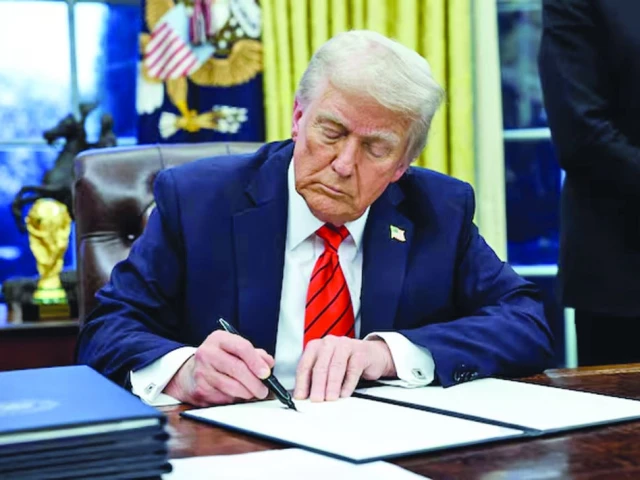Reciprocal tariffs: a scattergun approach
Trump's move may corrode global economy, shatter confidence of US manufacturers

US President Donald Trump's reciprocal tariffs, which appear to be a scattergun approach, may corrode the global economy, keep US allies away and above all shatter the confidence of both US manufacturers and consumers, who will feel the heat of the new economic policy.
Trump has ordered new "reciprocal tariffs" on every country taxing US imports to restore what he calls "fair" and "balanced" trade. However, global trade analysts believe the move will backfire as American manufacturers will have to pay more for raw material and in turn they will pass on the burden to consumers, which means both US manufacturers and consumers will suffer. Bad economics on the part of Trump is being witnessed.
According to Reuters, Wall Street is anxious further tariffs may accelerate US inflation, prevent the Federal Reserve from cutting interest rate and slow economic growth. The absence of further trade measures, for now, has driven global markets higher. Trump's potential targets include China, Japan, South Korea and the European Union.
On top of that, US allies have also started fulminating against Trump's strategy.
On February 9, Trump adopted a scattergun approach instead of a sniper one (approach). According to The Economist, as the president flew to the Super Bowl, he told reporters that he would announce new 25% tariffs on aluminium and steel imports. On February 10, the levies duly arrived. Trump sees tariffs as a way to incentivise foreign investment in America and boost domestic production.
"It's going to mean a lot of businesses are going to be opening in the United States," Trump said as he signed an order, which invoked domestic security as the justification. The tariffs threaten to punish America's allies more than its enemies – and will harm America's own economy. French President Emmanuel Macron has said that he should stop bashing Europe and focus on China.
US domestic producers, which now face less competition, are giddy. Ehsan Khoman and Soojin Kim of MUFG bank estimate that a 25% tariff will push up the cost of a tonne of steel imported into America from $755 to over $900, negating a cost advantage that America currently enjoys over Europe. In America and elsewhere, Trump's metals wars will corrode the economy.
BBC reported that historically the US had championed free trade and kept the majority of its tariffs low, except on certain products such as footwear and, more recently, steel and aluminium.
Regional expert and Centre for South Asia and International Studies Islamabad Executive Director Dr Mehmoodul Hassan Khan said US President Trump's newly announced "Fair and Reciprocal Trade Plan" appeared to be a strategic roadmap for a monumental restructuring of the international trading system in the wrong direction, which would cause severe geo-economic debacle, geopolitical disturbance and geo-strategic destruction for the world economies, communities, industries and supply chains, ultimately badly hurting lives of common people in the US and around the globe.
Realistically, there will be a heightened risk of high inflation, increasing economic uncertainty and marginalising its central bank's policy options to lower interest rates. Additionally, the debt pressure will also be exacerbated. Resultantly, the huge interest will eat into economic growth and common people will face Trump's economic fallacies.
Moreover, the cowboy mentality of Trump's economic team is aimed at grabbing all resources through tariff shootings, which sabotages the principles of the World Trade Organisation (WTO) and international trade.
Obviously, the series of thundering tariffs has many similarities with the former Union of Soviet Socialist Republics (USSR) and late president Mikhail Gorbachev's glasnost (openness) and Perestroika (restructuring) introduced in the mid-1980s, which ended with the disintegration of the USSR.
It seems that the latest announcement by Trump's administration has a killing instinct, which will have wide-ranging and threatening retaliation from other countries that are opposed to its unfair and harmful acts, policies and practices. Thus, the US manufacturing industries will feel the heat in terms of high raw material costs, declining investments, innovation and modernisation, ultimately reducing their national capacities. Resultantly, the US "Doing of Business" will further increase.
It is feared that the economic burden of tariffs can immediately and ultimately fall on common American citizens through potentially troubling self-inflicted wounds as inflation will begin to creep higher again.
US trade measures will escalate trade war and the affected economies will formulate counter-strategies, leading to more disruption in the global trade system and undermining trade negotiation mechanisms, particularly weakening the role of international institutions such as the WTO.
Trump's government and policymakers should have a democratic sense of the national wealth distribution system and international trade policies, otherwise whimsical governance and blind wishes will destroy the world economy.
US industries are losing the race of modernisation, digitalisation and foreign direct investment (FDI) because of persistent protectionism, unjustified sanctions and harmful laws that prompt other countries to stay away from its weak market.
Now, its industries are less developed, diversified, innovative and productive, which must be reactivated through constant economic policies, meaningful financial incentives and integrated industrial policies instead of imposing irrational tariffs on other economies.
It is feared that new tariffs will further depress US economic growth and contribute to a higher rate of inflation. Thus, Trump's wishful thinking and its so-called industrial revitalisation will be rusting away.
"Thus, China, being the second largest economy, should lead the collective response from Asia and Europe. China's economic globalisation, unconditional international cooperation, peaceful conflict resolution and diplomatic wisdom are needed to play an effective role in global governance and the restoration of world trade order," Khan said.
The writer is a staff correspondent



















COMMENTS
Comments are moderated and generally will be posted if they are on-topic and not abusive.
For more information, please see our Comments FAQ